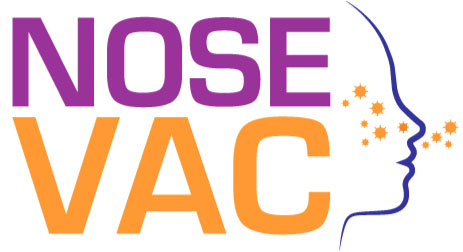- Over the next 5 years, the NOSEVAC consortium will work intensively to create nasal vaccines targeting S. pneumoniae and B. pertussis infections. On top of that, they will develop a bivalent nasal vaccine to simultaneously prevent influenza and COVID-19
María José Alonso’s and Noemi Csaba’s research groups at the Center for Research in Molecular Medicine and Chronic Diseases (CiMUS) of the University of Santiago de Compostela (USC) will participate in the NOSEVAC Consortium, a new European collaboration to develop nasal vaccines.
Bacterial and viral respiratory infections are significant contributors to global morbidity and mortality. Streptococcus pneumoniae and Bordetella pertussis, along with influenza virus and SARS-CoV-2, are causative agents of respiratory diseases that have substantial public health implications; acquired pneumonia, whooping cough, influenza, and COVID-19, respectively. The available vaccines against these diseases are administered via intramuscular or subcutaneous injection, and do not effectively prevent colonisation or infection of the upper respiratory tract (URT). Consequently, their impact on pathogen transmission is limited.
The NOSEVAC consortium, operating under the coordination of the European Vaccine Initiative (EVI), endeavours to cultivate and evaluate inventive nasal vaccine platforms as a ground-breaking approach to prevent the earliest stage of infection, thereby inhibiting URT colonisation, transmission, and disease. The project relies upon a distinctive consortium comprising 12 distinguished and complementary research teams hailing from the European Union (EU), UK and Switzerland.
Funding from the EU, the UK and Swiss governments allowed the project launch which, in addition to develop new nasal vaccine candidates, will:
• Develop vaccine formulations for nasal delivery of RNA- and protein-based antigens
• Discover bacterial antigens that promote colonisation of the URT
• Identify human host immune factors for long-term protection of the URT
• Address acceptability of nasal vaccination
It is expected that NOSEVAC will establish strategic research pathways to combat respiratory pathogens, encompassing those with the potential for large outbreaks. Furthermore, the organisation will serve as a catalyst for evidence-driven decision-making for policymakers and investors.
Quick facts about NOSEVAC:
Project full name: Innovative nasal vaccines to prevent pathogen colonization and infection in the upper respiratory tract.
Duration: 5 years (01 May 2023-30 April 2028)
Funding agency: European Commission
Budget: 11.1 € (with 6.8 Mio from EU)
Coordinator: European Vaccine Initiative (EVI)
Consortium: 12 partners (from 6 EU countries + UK+ Switzerland)
Contact:
Prof Dr Ole Olesen
European Vaccine Initiative (EVI) – Project Coordinator
Email: ole.olesen@euvaccine.eu
NOSEVAC partners:
PROJECT COORDINATOR
The European Vaccine Initiative (EVI)
PROJECT PARTNERS:
Epithelix
Erasmus MC – department of Viroscience
European Vaccine Initiative (EVI)
INSERM
Institut Pasteur de Lille
The Istituto Superiore di Sanità (ISS)
Quantoom Biosciences
University of Geneva
University of Lille 1 Sciences and Technology
University of Oxford
University of Lausanne – UNIL
Universidad de Santiago de Compostela
Veterna S.r.l.

This project has received funding from the European Union’s Horizon Europe research and innovation programme under grant agreement No 101080528
